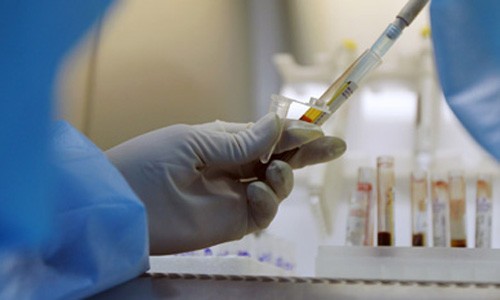
A senior health official on Wednesday advocated the use of real-name HIV testing, stating that the tests will be beneficial for the prevention and treatment of HIV/AIDS. Photo: Xinhua
The controversy surrounding the government's promotion of real-name HIV testing in Guangxi Zhuang Autonomous Region and Hunan Province reached a new high when two influential non-governmental organizations sent letters to related government bodies calling for an end to the draft regulation, which some experts believe may scare off test takers and even result in a further spread of the disease.
Tianxiagong (Justice for All), a Nanjing-based NGO that promotes welfare, benevolence and equality, and China Alliance of People Living with HIV/AIDS (CAP+), a non-profit information exchange and activity network, have respectively petitioned the Ministry of Health and the China Center for Disease Control and Prevention (CDC), to stop promotion of real-name testing nationwide.
"We sent the letters to the CDC this week, with the hope that related departments will cancel the real-name testing regulation," Meng Lin, coordinator of CAP+, told the Global Times Monday.
Wang Yu, director of the CDC, advocated the use of real-name HIV testing, which may soon be approved in South China's Guangxi Zhuang Autonomous Region, stating that the tests will be beneficial for the prevention and treatment of HIV/AIDS.
However, many HIV carriers, people infected with AIDS, and AIDS prevention activist groups have attacked the proposal, claiming this move may result in fewer people volunteering for testing, as discrimination against HIV carriers is a major social issue.
Meng said that according to their surveys, even when the HIV tests do not require that the subject's personal details be registered, nearly 80 percent were against taking it.
"Fewer than 20 percent of gays, who are considered to be a high-risk group, will take the tests as it is. If real-name testing is promoted, this number will drop," he added.
"Even with cash awards and anonymous testing systems, it is hard to encourage high-risk groups, including sex workers, gay and bisexual men, and drug users, to take the HIV tests. How can real-name testing increase the testing rate?" Meng said.
Mian Liping, coordinator of the World AIDS Campaign, also claimed that the regulation is impractical since very few HIV carriers in China would want to expose their condition.
"We can't deny that the current society can't provide HIV carriers with equal rights. Many high-risk groups might delay or dodge HIV tests for fear of personal information being leaked. So before related regulations and laws to protect carriers' privacy and rights are in place, the promotion of real-name testing may have a negative result," Mian said.
China offers HIV tests without asking for personal details, but some provinces and regions, such as Yunnan Province, have adopt the real-name registration policy.
Although the government claimed the move is to ensure those who test positive are informed in time, and that it will make it easier for data collection purposes, some HIV carriers are not convinced.
An HIV carrier from Guizhou Province, who asked to remain anonymous, told the Global Times Monday that exposure may drive many carriers like him away due to the fear of public discrimination.
"I can't watch TV in the living room as my family won't allow me to. If my family is like that, how can you ensure other people won't discriminate against us in the same way?" he said.

Copyright ©1999-2011 Chinanews.com. All rights reserved.
Reproduction in whole or in part without permission is prohibited.